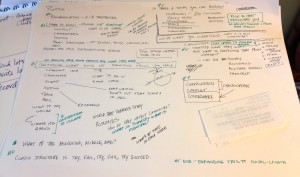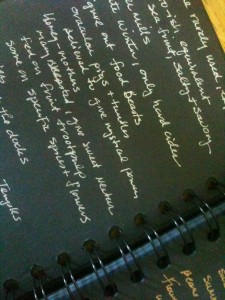

The first and most important is that I can feel a little burnout creeping up around the edges. I’ll be talking in a class and think to myself, “I know I’ve said this before,” and it will be because I have said it before, repeatedly even — but not to that class. I can tell that if I don’t take a break, that feeling is going to drown me.
The second is to focus even more on the writing, because there’s at least two books I’d like to finish up this year, along with the usual roster of short stories. (I’m at ten completed so far this year, which is unusually productive but highly pleasing.)
The third is because I don’t want to get in a rut. I want to go think about some new things and then come back ready to talk about them to students.
So – if you want a class with me in 2014 — check out the list now. I’ll probably list a couple more conversation classes in June, but that’s it. But I’ll be back in 2015!
...

Overall:
Characters:
World:
Enjoy this writing advice and want more content like it? Check out the classes Cat gives via the Rambo Academy for Wayward Writers, which offers both on-demand and live online writing classes for fantasy and science fiction writers from Cat and other authors, including Ann Leckie, Seanan McGuire, Fran Wilde and other talents! All classes include three free slots.
Prefer to opt for weekly interaction, advice, opportunities to ask questions, and access to the Chez Rambo Discord community and critique group? Check out Cat’s Patreon. Or sample her writing here.
...

As always, everyone’s writing process is different and the only one I can speak with authority about is my own. So perhaps this will click for you and perhaps it won’t. I hope it does.
Certainly, there are stories that arrive complete. They appear in my head and all I have to do is write them down. This is most likely to occur during the night, meaning I can rise, go to the keyboard, and bang it all out quickly. For example, “Pippa’s Smiles” arrived complete and ready to go, though it had its roots in some thoughts I had been mulling over about gendered narratives. Unfortunately, though, that’s not usually how it works.
For me, stories can start in a number of ways.
...
 We had the first session of the advanced workshop last night. I’m delighted by the mix, and expecting wonderful things from the class. Some are published already, some are just breaking in.
We had the first session of the advanced workshop last night. I’m delighted by the mix, and expecting wonderful things from the class. Some are published already, some are just breaking in.
Unlike the Writing Fantasy and Science Fiction Stories class, we are not focusing on one of the basics each week, like characters, plot, or world building. Instead, I am trying to let the class drive itself where it can. My hope is that everyone, by the end of class, has not just been critiqued a couple of times, but has a better sense of their writerly process and how to make it more efficient, more confidence in finishing stuff and getting it sent out, and new ways of moving story from idea to finished draft.
So here is the assignment I gave them, in the hope that it will prove useful for other writers trying to figure out their process:
Enjoy this writing advice and want more content like it? Check out the classes Cat gives via the Rambo Academy for Wayward Writers, which offers both on-demand and live online writing classes for fantasy and science fiction writers from Cat and other authors, including Ann Leckie, Seanan McGuire, Fran Wilde and other talents! All classes include three free slots.
Prefer to opt for weekly interaction, advice, opportunities to ask questions, and access to the Chez Rambo Discord community and critique group? Check out Cat’s Patreon. Or sample her writing here.
...
 I’m glad I’ve got enough students for the Editing 101 online class that starts tonight, but I’d love a couple more. Mention reading this when you mail me about the class and I’ll give you a special deal. 😉
I’m glad I’ve got enough students for the Editing 101 online class that starts tonight, but I’d love a couple more. Mention reading this when you mail me about the class and I’ll give you a special deal. 😉
So what do we do and who is the class aimed at?
The class is aimed both at writers who want to learn to edit their work better as well as editors who want to hone their skills and learn about it as a career path.
Here’s what the three two-hour sessions cover. They’re spaced two weeks apart.
Got questions? I’d be happy to answer them.
...
Okay, so I’ve realized I have to bite the bullet and learn to do some graphics stuff or else be dependent on other people, which is irritating. So here’s an attempt at a postcard advertising my classes, which I thought I’d use at cons to promote them. I know this is lame, but suggestions are very welcome. First up is a different font, I think.

...

So now I’ve worked my way through BEST SERVED COLD and am on the third volume of the First Law trilogy, which starts with THE BLADE ITSELF (and I can tell I’m going back to read both of the first two, in order to see better how they fit with the First Law trilogy). I’ve got to say, gee whiz, when Delany is talking about how you can only write stuff as good as the best stuff you’re reading, this is the sort of thing he’s talking about, because I know I’ve learned a good bit about the subject matter mentioned in the title from looking to see how Abercrombie does it.
...
If you're interested in the writing F&SF, flash fiction, or editing class – there are some slots still open (only 2 in F&SF).
http://www.kittywumpus.net/blog/2012/01/04/online-classes-and-workshops-for-2012/
...

I love teaching online. I feel that I’m connecting with the students in a more meaningful and interesting way than in a once a week, face to face classroom. Through Google+, I can have a channel that is dedicated to the students, which means we’re talking and passing links back and forth throughout the week.
I use Google Hangouts. They are awesome. If you’re never tried them, here’s some basic information. I create a circle for each class, and another that is the students from all classes, and use those. I share the class circle with the class, so they have it as well, and can post to it. If you’re utterly confused by what I’m talking about when I say “circle,” this may be helpful. When I am ready for to a class to start, I open up a Google hangout and share it with the class circle.
The video is smooth in a way that makes me feel that I’m actually in the 21st century. It’s much lower key than I thought it would – after you’ve done it once, some of the nervousness fades away, and it doesn’t feel as though you’re “on stage” in the way one is when in the classroom. There’s been some adjustments with mikes and such, but one thing I did beforehand was have a “dry run” session, where people could log in and confirm that everything was working fine for them. A couple of times we had people participating with audio only — that worked fine. The format also means that people have been able to attend class while on the road – I just finished a session where one participant was logged on from the train station.
Google Hangouts includes a chat window, which I love, because while I’m lecturing, students can be typing questions, comments, and other feedback into the chat, which allows me to then look at it and incorporate it into the flow of the lecture. Instead of writing on the board, I can put things that are particularly important into the chat window. Google+ also allows people to share their work with the group through it, rather than sending out stories to be workshopped via e-mail.
The capability for watching Youtube videos as part of class is there, which is nice, but given the limited amount of time we have in class, I’d rather not use it on that for the most part. Still, I could see using some pieces in class instead of assigning them to be watched outside of it. Here’s some examples of ones I think would work well: Kurt Vonnegut on the shapes of stories, Terry Bisson’s “They’re Made Out of Meat,” Jack Kerouac on writing.
Things that I have learned:
I’m hoping to make the classes a regular part of how I make my income, and I still need some sign-ups for the upcoming batch, so I’m going to extend the special rate through midnight mext Friday. Here’s the details for those classes – please spread the word!
...

In the course of one workshop the topic of writing about rape came up and Jim C. Hines has provided a timely article about it in the most recent Apex Magazine. In brief, Don’t use rape as 1) easy motivation for a character or 2) shorthand for how bad someone is and do some research about things like the mental aftereffects if you’re going to write about it.
If you want to read a piece that does it well (and harrowingly), I would suggest The Sparrow by Maria Doria Russell. I also mentioned Susan Griffin’s Woman and Nature: The Roaring Inside Her.
Also mentioned last week as a great book for looking at sentence and paragraph level writing:
Style: Ten Lessons in Clarity and Grace
...
Want access to a lively community of writers and readers, free writing classes, co-working sessions, special speakers, weekly writing games, random pictures and MORE for as little as $2? Check out Cat’s Patreon campaign.

"(On the writing F&SF workshop) Wanted to crow and say thanks: the first story I wrote after taking your class was my very first sale. Coincidence? nah….thanks so much."

(fantasy, short story)
General Aife Crofadottir was acknowledged the greatest military mind of her generation—perhaps even her century. No wonder then that the sorcerer Balthus recruited her early in her career, setting her to rally armies of Beasts and magically-equipped soldiers, planning campaign after campaign, until finally he stood the ruler of a vast expanse of the continent’s northeastern corner. Once fertile lands, once countries, now only uncontested, devastated territories. Three years after her death, she still labored in his service.


This site is protected by reCAPTCHA and the Google Privacy Policy and Terms of Service apply. This site is a participant in the Amazon Services LLC Associates Program, an affiliate advertising program designed to provide a means for sites to earn advertising fees by advertising and linking to Amazon.com.